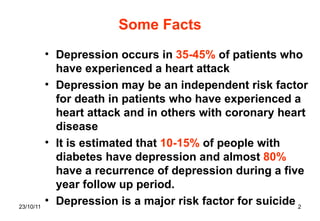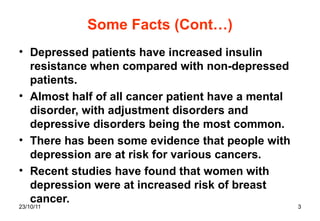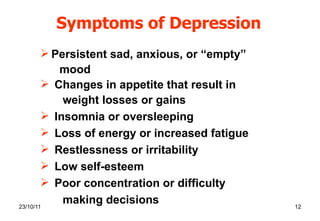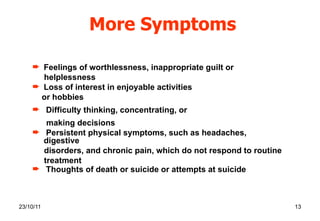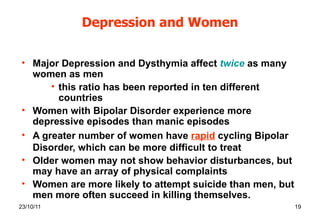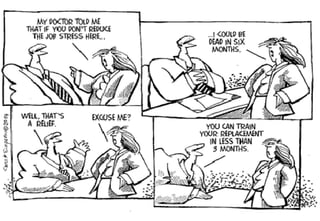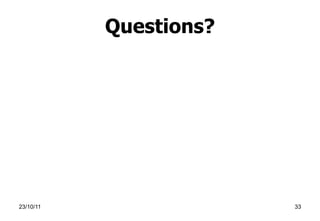Depression in the workplace
- 1. Depression, Signs, Symptoms and Coping Strategies BP Communications & External Affairs 8 th April 2005 Dr. Erum Maqbool Clinical Psychologist & Independent Consultant Employee Assistance Program
- 2. Some Facts Depression occurs in 35-45% of patients who have experienced a heart attack Depression may be an independent risk factor for death in patients who have experienced a heart attack and in others with coronary heart disease It is estimated that 10-15% of people with diabetes have depression and almost 80% have a recurrence of depression during a five year follow up period. Depression is a major risk factor for suicide
- 3. Some Facts (Cont…) Depressed patients have increased insulin resistance when compared with non-depressed patients. Almost half of all cancer patient have a mental disorder, with adjustment disorders and depressive disorders being the most common. There has been some evidence that people with depression are at risk for various cancers. Recent studies have found that women with depression were at increased risk of breast cancer.
- 4. “ KARACHI REPORTS ONE OF THE HIGHEST INCIDENCE OF BREAST CANCER FOR ANY ASIAN POPULATION” WHO Survey 2006
- 5. Lying awake, calculating the future, Trying to unweave, unwind, unravel And piece together the past and the future, Between midnight and dawn, When the past is all deception, The future futureless. T.S Eliot
- 6. Impact The key is to recognize symptoms of depression early and to receive appropriate treatment. Nearly 2 out of 3 people with depression do not receive the help that they need. Some form of substance abuse disorder occurs in about one-third of people with any type of depressive disorder.
- 7. Facts from the National Mental Health Association Of the 10 major causes of disability worldwide, five are mental health and substance abuse problems, with major depression accounting for 11% of all disability cases. (Making it # 1)
- 8. Prevalence of Anxiety and Depressive Disorders in Pakistan Mean overall prevalence of anxiety and depressive disorders in the community population is 34% (range 29% - 66% for women and 10% - 33% for men) Overall mean 45.5% for women) Overall mean 21.7% for men Illyas Mirza and Rachel Jenkins, April 3, 2004
- 10. What is Depression? Depression is a very common mood disorder that can be serious... it is pervasive it is intense it attacks the mind and body Depression has a variety of symptoms, but the most common is a deep feeling of sadness.
- 11. Depression can result in serious disturbances of social, work and bodily functioning. Unlike ordinary sadness, the “blues,” or grief from the loss of a loved one, major (clinical) depression usually does not respond to a change in circumstances, good news or the passing of time.
- 12. Symptoms of Depression Persistent sad, anxious, or “empty” mood Changes in appetite that result in weight losses or gains Insomnia or oversleeping Loss of energy or increased fatigue Restlessness or irritability Low self-esteem Poor concentration or difficulty making decisions
- 13. More Symptoms Feelings of worthlessness, inappropriate guilt or helplessness Loss of interest in enjoyable activities or hobbies Difficulty thinking, concentrating, or making decisions Persistent physical symptoms, such as headaches, digestive disorders, and chronic pain, which do not respond to routine treatment Thoughts of death or suicide or attempts at suicide
- 14. Depression EMOTIONAL SYMPTOMS Sadness Loss of pleasure COGNITIVE SYMPTOMS Negative views of self Hopelessness Poor concentration and memory; confusion MOTIVATIONAL SYMPTOMS Passivity Will not initiate or persist at activities PHYSICAL SYMPTOMS Changes in appetite and sleep Fatigue Increase in aches and pains
- 15. Symptoms Cont’d Over generalization Selective abstraction Magnification and minimization Personalization Arbitrary Influence
- 17. Depression and Men Men are less likely to ask for help or seek treatment Men are more likely to focus on physical complaints_headaches, digestive problems or chronic pain Men are more likely to complain of fatigue and sleep disturbance Men are more likely to turn to alcohol and drug use Men are more likely to throw themselves into some activity
- 18. Symptoms of Male Depression often include: Anger and frustration Violent behaviour Losing weight without trying Taking risks, such as reckless driving and extramarital sex Loss of concentration Isolation from family and friends Avoiding pleasurable activities Fatigue Loss of interest in work, hobbies and sex Alcohol or substance abuse Misuse of prescription medication Thoughts of suicide
- 19. Depression and Women Major Depression and Dysthymia affect twice as many women as men this ratio has been reported in ten different countries Women with Bipolar Disorder experience more depressive episodes than manic episodes A greater number of women have rapid cycling Bipolar Disorder, which can be more difficult to treat Older women may not show behavior disturbances, but may have an array of physical complaints Women are more likely to attempt suicide than men, but men more often succeed in killing themselves.
- 20. Causes of Depression in Women Biological - mutant gene on the X chromosome By virtue of their roles in society women are more prone to experiencing a sense of lack of control over negative life events Different responses to being in a depressed mood - More likely to ruminate
- 21. Depression and Children Decrease in grades or school attendance Decrease interest in activities Change in sleep or appetite - adolescent females may develop eating disorder Increased self-criticism Problem with family or friends
- 22. What Causes Depression? Biochemistry: Deficiencies in two chemicals in the brain (serotonin and norepinephrine) are thought to be responsible for certain symptoms of depression, including anxiety, irritability, and fatigue.
- 23. Genetics: Depression can run in families. For example, if one identical twin has depression, the other twin has a 70% chance of also having the illness during their lifetime. Causes, cont’d
- 24. Environmental and Other Stressors: Significant loss, a difficult relationship, financial problems or a major life change are often cited as contributors to depression. Continuous exposure to violence, neglect, abuse, or poverty may make people more vulnerable to depression. Depression can also occur under ideal living circumstances! Causes, cont’d
- 25. Physiological: Sometimes the onset of depression is associated with, or a symptom of, an acute or chronic physical illness, such as stroke, diabetes, heart attack. It can be a side effect of medication or a symptom of drug or alcohol abuse. Depression can be the result of dieting or a hormonal change in females. Causes, cont’d
- 26. Personality : People with low self-esteem, who are easily overwhelmed by stress, have a tendency to worry excessively or who are generally pessimistic, appear to be especially vulnerable to depression. Causes, cont’d
- 28. Men are not moved by things but the views which they take of them----Epictetus If thou are pained by any external thing, it is not this thing that disturbs thee, but thine own judgment about it. And it is in thy power to wipe out this judgment now---- Marcus Aurelius
- 29. Depression can be… Mild or Severe Obvious or Masked Episodic or Chronic Psychotic
- 30. What are the Types of Depression? Major Depression * Bipolar Disorders * Dysthymia Seasonal Affective Disorder (SAD) Co-Occurring Depression
- 31. How is Depression Treated? Medication Psychotherapy Combination of both
- 32. Some Self help Tips To Combat Depression Maintain a healthy diet Manage your sleep wake cycle Develop a support system Diversify your interests Let go of your emotions Be close to nature Religion Improve your self talk Develop a sense of humour Trust in time Clarify your values
- 33. Questions?
- 34. Contact Details! Aiwan-Shifa Medical Centre 2 nd Floor, Sasi Arcade Main Clifton Road, K.D.A., Scheme No. 7, Karachi Phone: 021-5831481-2 Mualij 154-M, Block-2 PECHS, Karachi Ph: 4552147 & 4552157 Mobile: 0300-9228718
Editor's Notes
- As you can see from the statistics, many of your co-workers could be struggling with depression on a daily basis. Reasons people don’t receive help? Don’t recognize it Stigma Ego - I can do it myself Misunderstanding of the illness
- Ask the audience to define depression : “ What is depression?” and “what have you seen on tv, or read, to help you come to the impression?” Affects body and mind simultaneously. All consuming. Unexplained aches and pains. Chemical imbalance affects pain perception. Sometimes described as feeling empty.
- Depression is different from transitional issues that one may experience during life. Depression related to grief will lessen over time, while clinical depression will increase w/o trxt.
- Certainly, a few of these symptoms may be caused by other physical problems, so for the purpose of this presentation, we will make the assumption that other physiological illnesses have been ruled out.
- Overgeneralizations: Drawing a sweeping conclusion on the basis of a single event e.g. a student concludes from his poor performance in one class on a particular day that he is inept and stupis. Selective abstraction: Focus on an insignificant detail, while ignoring the most important feature of a situation. For example, from a conversation in which her boss praises her overall job performance, the secretary remembers the only comment that could be construed as mildly critical. Magnification and minimization: Magnifying small bad events and minimizing major good events in evaluation performance. For example, a woman gets a small dent in her car fender and views it as catastrophe (magnification), while the fact that she gave excellent presentation in class does nothing to raise her self esteem. Personalization: Incorrectly assuming responsibility for bad events in the world e.g when rain dampens spirits at an outdoor buffet, the host blames himself rather than the weather. Arbitrary inference: Drawing a conclusion when there is little evidence to support it. For example, a man concludes from his wife’s sad expression that she is disappointed in him; if he had checked out the situation, he would have discovered that she was distressed by a friend’s illness.
- Men experience depression differently and often don’t talk of it in terms of sadness or hopelessness. Are often ashamed or embarrassed. Try to hide it. May act out in anger or engage in reckless activities.
- Research shows that depression is occurring earlier than in past decades Only 1% of pre puberty are depressed. 4 out of 10 teens seriously depressed Irritable, argumentative, moody for more than 2 wks -- might not be typical teen Stress, family life more chaotic (moves, divorce, not fitting in, not doing well in school, etc) Adolescents are impulsive, they do it to call attention to their probs, to get back at Ps
- Research shows that depression is occurring earlier than in past decades Only 1% of pre puberty are depressed. 4 out of 10 teens seriously depressed Irritable, argumentative, moody for more than 2 wks -- might not be typical teen Stress, family life more chaotic (moves, divorce, not fitting in, not doing well in school, etc) Adolescents are impulsive, they do it to call attention to their probs, to get back at Ps
- There are several factors that may determine whether someone develops depression sometime during his/her lifetime. Biochemistry is one factor. It is not known whether the biochemical disturbances of depression are of genetic origin or are secondary to stress, trauma, illness, or some other environmental condition. Serotonin - sex, appetite & aggression Norepinephrine - concentration, interest, motivation
- Genetics is another factor. Sometimes it will skip a generation. Important to note: Not everyone who has depression in their family will develop depressive symptoms. And, major depression can occur in people who have no family members with the illness.
- The environment may also make some people more disposed to developing depression but, it is not an absolute. In other words, some people have a family history of depression, and have been exposed to difficult environmental conditions, but are resilient and never develop the illness.
- Neurological, cancer, heart attack, hypothyroidism can all have accompanying depression. If depression is due to another medical condition, it is not considered a clinical depression and therefore not diagnosed.
- Specific personality traits may also have an influence on whether someone develops the symptoms
- Explain each . Meds, hospitalization, suicidal . In children often masked by irritability . One episode vs lifetime . Delusions or hallucinations
- There are a number of types of depression. *For the purpose of this presentation and in consideration of time, we will discuss the most common types: Major Depression and Bipolar Depression. Major Depression - the most common Bipolar - both highs & lows, requires mood stabilizer & anti-dep Dysthymia - mild, but long lasting (2+ yrs), incl 2 or 3 symptoms SAD - mood fluctuates w/ the seasons (winter depression)
- In the past 10 years, 9 new anti-depressants were released in the US. More tolerable side effects, safer, simpler dosing - all of which results in better compliance & improved physician utilization. Some PCPs are not skilled in, or comfortable with, prescribing psychiatric meds.

